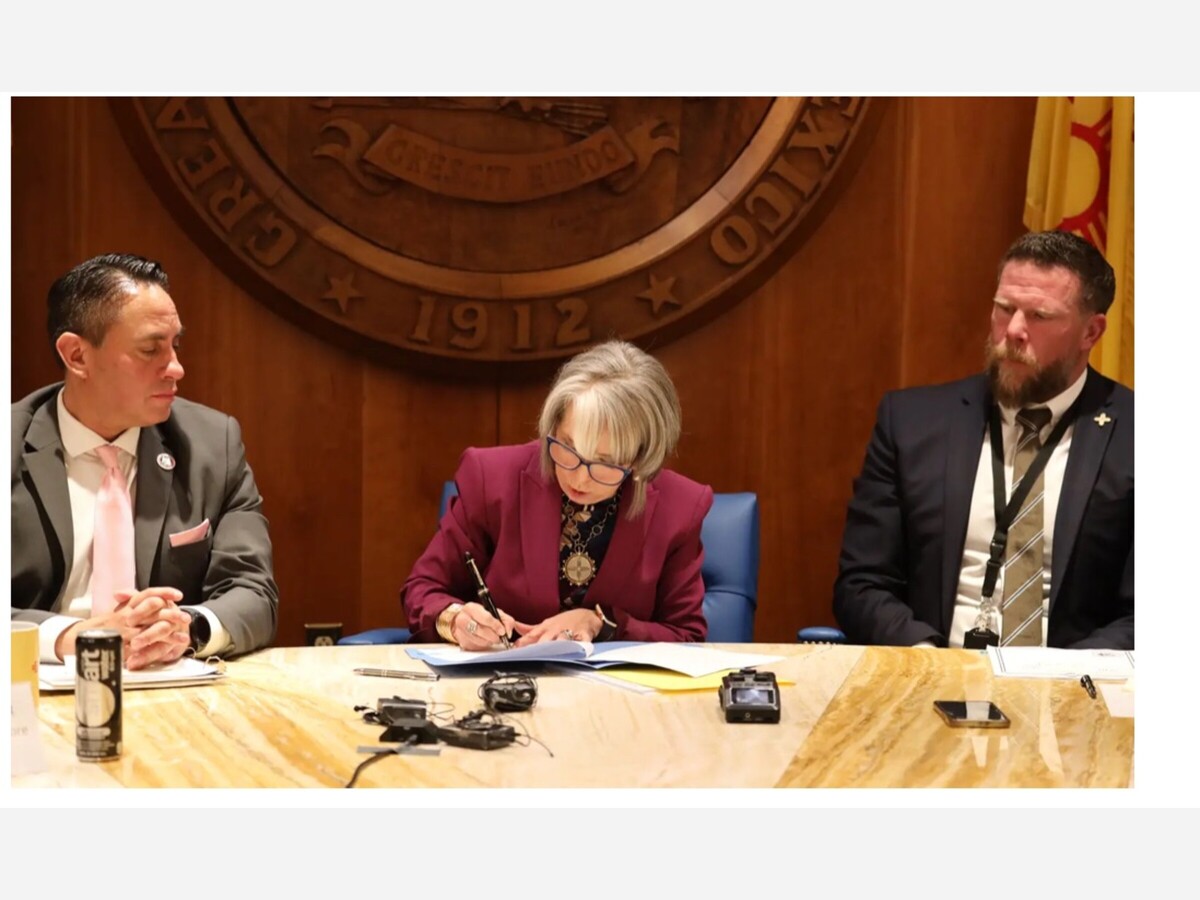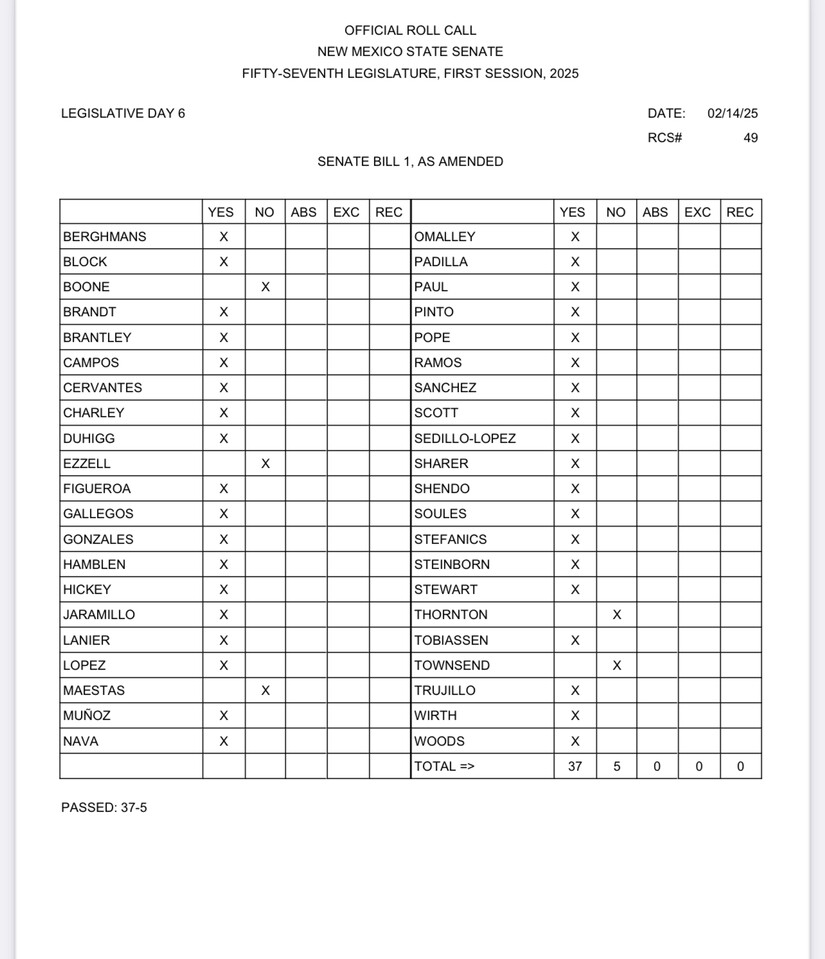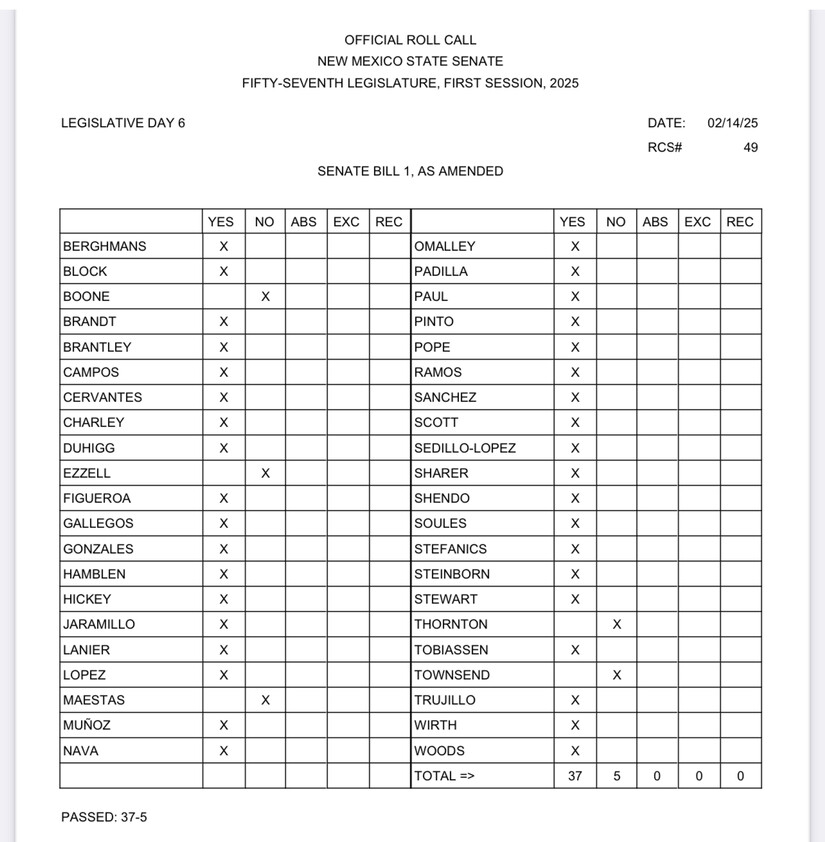Image


New Mexico Gov. Michelle Lujan Grisham on Thursday signed legislation to improve public safety and behavioral health services across New Mexico, marking the halfway point of the 60-day legislative session with a landmark accomplishment on behalf of New Mexicans
Otero County Representative Block voted against all actions of behavioral health and and criminal justice reforms endorsed by such leaders as the Las Cruces police chief and a majority of the states District Attorney's, the State Attorney General and others in law enforcement and most mental health care providers.
“These bills represent a significant milestone for both behavioral health services and criminal justice reform in New Mexico,” said Gov. Lujan Grisham, who was joined by lawmakers, public safety officials and community members during a bill signing ceremony at the Roundhouse. “By strengthening our criminal justice system and investing in behavioral health, we’re taking decisive action to address the root causes of crime while ensuring accountability.”
The bills the governor signed Thursday reflect serious concerns about public safety she heard from constituents during town halls she hosted across 15 New Mexico communities over the past year. The new public safety laws resulted from collaboration among the executive branch, legislature, law enforcement, and community advocates.
The governor signed House Bill 8, a public safety omnibus package sponsored by Reps. Christine Chandler, Joy Garratt, Cynthia Borrego, Kathleen Cates, and Charlotte Little. HB 8 is a comprehensive public safety package addressing multiple areas of concern.
Local House Representative John Block voted NO against HB8...

Otero County Senators Townsend and Paul voted yes for HB8 which included:
Criminal competency reform – Addresses over 18,000 criminal charges dismissed since 2017 due to competency issues by creating a community-based restoration program for non-violent offenders and requiring secure facility commitment for violent non-competent defendants.
Weapon conversion devices – Criminalizes possession of weapon conversion devices or “Glock Switches,” targeting rising juvenile gun crimes.
Shooting threats – Elevates the penalty for threatening to shoot a person, group, or public space from a misdemeanor to a fourth-degree felony, allowing courts to order restitution for economic harm caused by threats.
Fentanyl trafficking – Establishes graduated penalties for trafficking based on quantity, with specific enhancements for larger amounts and for those organizing trafficking operations.
Auto theft penalties – Increases penalties for repeat offenders with a graduated system that elevates charges for subsequent offenses.
DWI blood testing – Permits warrant-based blood draws for misdemeanor investigations and expands testing beyond alcohol to include other drugs.
“We made a promise to New Mexicans that we would come into this session ready to move efficiently on meaningful legislation to improve public safety and behavioral healthcare throughout our state. We are people of our word,” said Speaker of the New Mexico House of Representatives Javier Martínez. “This is a milestone worth celebrating but our work is not done. It’s going to take all of us, coming together like this, again and again, to work toward real solutions.”
“House Bill 8 is the result of an open, collaborative legislative process. We listened to the people of our state, community leaders, experts, and law enforcement, and we worked with our colleagues in both chambers and both sides of the aisle to develop solutions,” said Rep. Christine Chandler, bill sponsor. “Combined with significant and historic investments in our behavioral healthcare system, this robust and carefully crafted set of legislation will have a real, meaningful impact on the issues facing New Mexicans today.”
“While today marks significant progress, our work on public safety in this session is not done,” said Lujan Grisham. “I urge New Mexicans to contact their legislators and ask them to send additional public safety bills—including measures addressing felons with firearms, pretrial detention reform, and juvenile code amendments—to my desk before they adjourn.”
“Our juvenile justice system is broken,” said District Attorney Sam Bregman. “With 25 young people currently facing murder charges and detention centers at full capacity statewide, we’re in crisis. While overall crime is declining in Albuquerque, juvenile crime continues to surge. We’re operating with a juvenile code that predates the iPhone. The single most effective step to reduce violent crime in our community is modernizing our juvenile justice system with meaningful consequences alongside behavioral health support. The legislature must act now.”
Also on Thursday, the governor signed two major behavioral health bills:
Senate Bill 1: Behavioral Health Trust Fund, sponsored by Sens. George K. Muñoz, Elizabeth “Liz” Stefanics, Pat Woods, Jay C. Block, and Rep. Dayan Hochman-Vigil. It establishes a dedicated trust fund to provide sustainable, long-term financing for behavioral health programs across the state. The fund will support mental health and substance use treatment, prevention programs, infrastructure development, and workforce expansion, with administration by the Health Care Authority under legislative oversight.
Otero County Rep. Block voted NO.

Senator Paul Voted YES.

Senate Bill 3: Behavioral Health Reform and Investment Act sponsored by Sens. Wirth, Stewart, Sharer, Block, and Rep. Hochman-Vigil. It creates a behavioral health executive committee to coordinate statewide reform efforts through a regionalized approach based on local needs assessments. The act streamlines administration for Medicaid providers, builds a behavioral health workforce pipeline, requires regular service gap assessments, and ensures accountability through monitoring and evaluation.
“New Mexico is in a fortunate position to secure our future by investing ‘today’ money for a brighter tomorrow. The creation of this Behavioral Health Trust Fund represents a forward-thinking approach to addressing the state’s growing needs for mental health and substance abuse services. By setting aside a substantial amount of funding now, the state is establishing a sustainable financial foundation to pay for essential behavioral health services for years to come. I thank Gov. Lujan Grisham for making this investment in our future a reality today,” said Sen. Elizabeth (Liz) Stefanics.
Block voted NO against House Bill 3.

Senator Paul voted yes to Senate Bill 3.

“Senate Bill 3 provides oversight and accountability to ensure the behavioral health money we invest is spent wisely. Rebuilding our behavioral health system is also a key component of the public safety package since we will never incarcerate our way out of the addiction crisis facing New Mexico,” Sen. Peter Wirth, Majority Floor Leader.